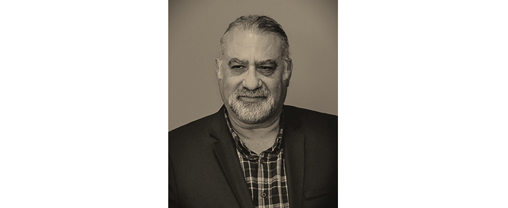Ümit İnatçı was born on November 28, 1960, in Limassol, Cyprus. He completed his higher education on a scholarship at the “Pietro Vannucci” Academy of Fine Arts in Perugia, Italy, graduating at the top of his class in Painting (1984). Following this, he pursued postgraduate studies in Visual Communication Design at the European Institute of Applied Arts in Perugia. In 1998, he received his proficiency in art degree and continued his academic career until 2018, teaching at various universities both in Cyprus and abroad. Over the years, he has held several key administrative positions, including Department Head, Dean, and Founding Rector.
His academic expertise includes Art History, Modern Art Philosophy, Art Criticism, Basic Design, Visual Rhetoric, and Film Semiotics. He held his first solo exhibition and published his first poetry book in 1983.
Throughout his career, he has held 48 solo exhibitions and participated in 96 group exhibitions in Cyprus and numerous countries including Italy, the UK, Denmark, the Netherlands, Belgium, France, the USA, Iran, Northern Iraq, China, Greece, Turkey, Kosovo, Albania, and the UAE. Among his many awards is the Gold Medal for Best Artist at the 1993 Sharjah International Biennial. His works are featured in museums, public institutions, and private collections worldwide. His literary works, including poetry and short stories, have appeared in international anthologies and selections in various languages. In addition to publishing 45 books in the fields of literature, art, and politics, his articles and essays have been widely published in newspapers, magazines, and books both locally and internationally.
He has served as the president of the Cyprus Art Association and the Cyprus Artists and Writers Union, and he is the founder and editor-in-chief of the artist and writers union’s publication, “İnsan Zaman Mekân” magazine.
After completing his academic studies in 1984, he enrolled at Cinecittà Experimental Cinema Center in 1985 to pursue film education. During a visit to Cyprus, he was arrested at the airport for failing to comply with compulsory military service and was taken to a military camp. He served two years under penal soldier status. Following a brief employment period, he was forced to return to Italy due to political persecution and his oppositional stance.
In 1989, while residing in Italy, he visited the free area of Cyprus for an exhibition and was declared “persona non grata” by the occupying regime. As a result, he decided to return and settle in Cyprus with his family. Between 1991 and 1995, he worked as a radio and TV program producer and presenter at the Cyprus Broadcasting Corporation. From 1995 to 1997, he was a lecturer in Turkish Language at the University of Cyprus, Department of Turkish Studies. In 1997, he returned to Italy with his family and lived there for a year as a political asylum seeker.
In 1998, he returned to the occupied area of Cyprus and was detained upon arrival at the airport for questioning over articles and interviews he had given while living in the free Cyprus. He was released the following day but faced difficulties finding employment. After working for two years at a private university, he was dismissed due to his political writings. He then moved again to the free part of Cyprus. After a period of unemployment, the Government of Cyprus appointed him as Cultural Attaché to the Republic of Cyprus High Commission in London, where he served for nearly two years.
In early 2004, he resigned from his post in London and returned to northern Cyprus. While seeking academic opportunities, he worked in graphic design, publishing, interior, and furniture design. From 2005 until his retirement in 2018, he resumed his academic career at various universities.
He is married with two daughters and has two grandchildren. While residing in Famagusta, he continues to produce art in his studio located in the free part of Nicosia. He is currently the founder and editor-in-chief of Ars Axis , an international journal on art and visual culture.

